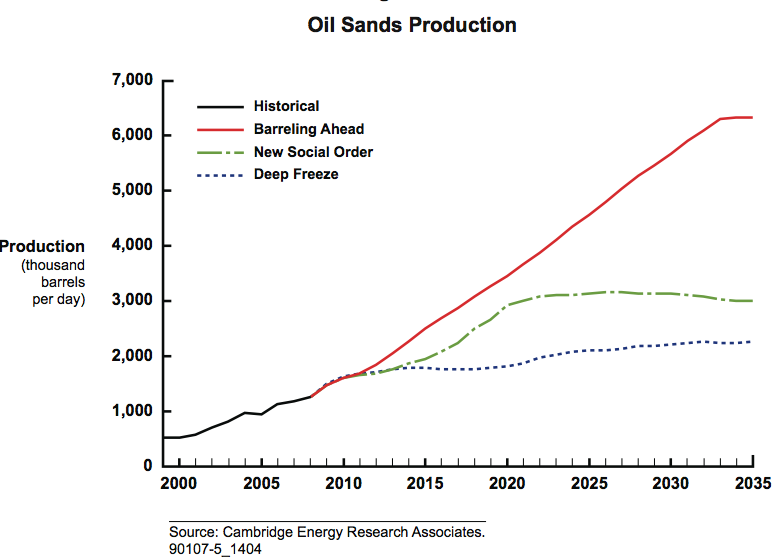Les nouveaux développements des sables bitumineux du Canada sont de plus en plus contestés de toute part, même l'Eglise Catholique Romaine s'y met
 lien
lien
Un évèque d'Alberta appelle à l'arrêt du développement des sables bitumineux.
Dénonçant le sacrifice de la création au profit de l'économie.
Alberta Bishop calls for halt on oilsands growth
Creation being 'sacrificed' for economic gain
BY KELLY CRYDERMAN, CALGARY HERALDJANUARY 27, 2009BE THE FIRST TO POST A COMMENT
The bishop of the Roman Catholic diocese that covers Fort McMurray has waded into the environmental debate over the oilsands, arguing future development there "constitutes a serious moral problem" and goes against God's teachings.
In an online pastoral letter for Catholics in northeastern Alberta, Bishop Luc Bouchard of the Diocese of St. Paul calls for a moratorium on further oilsands development until environmental and social concerns are addressed.
"I am forced to conclude that the integrity of creation in the Athabasca oilsands is clearly being sacrificed for economic gain. The proposed future development of the oilsands constitutes a serious moral problem," Bouchard writes in the long and extensively footnoted letter.
"Environmentalists and members of First Nations and Metis communities who are challenging government and industry to adequately safeguard the air, water and boreal forest ecosystems of the Athabasca oilsands region present a very strong moral argument, which I support," he said, calling for residents to contact their MLAs and MPs on the issue.
"The present pace and scale of development in the Athabasca oilsands cannot be morally justified. Active steps to alleviate this environmental damage must be undertaken."
Bouchard's words come as global pressure intensifies to reduce the oilsands development's increasing greenhouse gas emissions and water use, as well as greater protections for Alberta's boreal forest. There are also numerous concerns about the downstream health effects on First Nations communities.
It is also a time when many in the oil-patch have been laid off or are worried about job security.The Canadian Association of Petroleum Producers predicted last week that oilsands investment in Alberta this year will fall to about half of what was projected last summer, due to deferred projects.
The bishop's own priests acknowledge Bouchard's words are likely to stir great debate.
Father Gerard Gauthier, the Catholic pastor for St. John the Baptist parish in Fort McMurray--which falls under the Diocese of St. Paul--said he expects his congregation's reaction to Bouchard's comments to be "mixed."
"Those who are working for the oil will say, 'How dare the bishop do this?' Those who are more environmentally-conscience will say, 'He didn't go far enough.' "
In his letter, Bouchard said it's impossible to ignore the "extraordinary and controversial industrial development" in his own backyard. His criticisms, he said, are not aimed at the people of Fort McMurray but to"oil company executives in Calgary and Houston, to government leaders in Edmonton and Ottawa, and to the general public whose excessive consumerist lifestyle drives the demand for oil."
Bouchard lays out his concerns using what he describes as "foundational Catholic theological principles supporting environmental ethics," arguing that "when people destroy or damage creation they are limiting their ability to know and love God."
Bouchard then calls for 10 actions, including safeguarding the integrity of the Athabasca watershed and implementing a national energy conservation program.
In previous years, Melissa Blake, mayor of the Regional Municipality of Wood Buffalo, which includes Fort McMurray, has criticized the pace of oilsands development allowed by Alberta.
"I have a faith and my faith isn't telling me we should be at an absolute moratorium. What it's telling me is we need to be responsible," Blake said Monday, reacting to Bouchard's comments.
"I can't say what God wants me to do or not do. I can just say within reason there are things we should be doing differently."
At this point, Blake said she is"relieved" by the current economic slowdown, as the community is still suffering labour and infrastructure shortages.
In reaction to Bouchard's comments, CAPP issued a statement saying "we invited the input of all Canadians to identify and address their concerns regarding oilsands development and we accept the bishop's input as part of that process."
The industry lobby group added they would like to sit down for a talk with the bishop. "We strongly believe oilsands development is sustainable, regulated and the cornerstone of Canada's resource supply," CAPP said.
The Fort McMurray-based Oil Sands Developers Group offered to speak with Bouchard, and also take him for a tour of the oilsands.
"We take those concerns seriously," group president Don Thompson said Monday.
Simon Dyer, oilsands researcher with the Pembina Institute, an environmental think-tank, called Bouchard's letter "amazingly well-researched and thoughtful."
Dyer said Bouchard's letter appears to be a part of a rising trend--an increasing number of faith-based organizations are highlighting the importance of environmental conservation.
"The environment and social issues here are important to Albertans and Canadians," Dyer said.
According to its website, the St. Paul Diocese covers 155,916 square kilometres, and serves close to 55,000 Catholics in northeastern Alberta.
The diocese website lists Bouchard as having a long and well-travelled resume, with a focus on both music and religion.
Born in Cornwall, Ont., in 1949, he has studied in Toronto, Ottawa, Rome and Jerusalem. He lists his languages spoken and written as French, Spanish, Italian and English.
© Copyright (c) The Calgary Herald
Toujours moins.





